Which 5 challenges arise from studying online?

This is the second of three chapters about Studying Online. To complete this reader, read each chapter carefully and then unlock and complete our materials to check your understanding.
– Review the concept of online learning at the university level
– Discuss five challenges that face the online learner
– Explore five online study tips for overcoming these challenges
Before you begin reading...
-
video and audio texts
-
knowledge checks and quizzes
-
skills practices, tasks and assignments
Chapter 2
Studying online can involve a variety of new learning contexts for students, from participating in live seminar video calls to watching recorded lectures and contributing to online-forum discussions. While these environments may be new for many, the good news is that most learners adapt to them fairly quickly. The even better news is that while there may be some challenges to this style of learning, successful online study is able to develop helpful skills that will benefit you for years to come. This chapter therefore prepares students who are new to studying online for the various challenges they may encounter and learn to overcome.
Challenge 1: Reading Body Language
The first challenge is non-verbal and related to body language. We all use body language to help emphasise what we’re saying, to gesture towards visual aids or perhaps to signal another speaker. We use non-verbal language unconsciously and we read it unconsciously too. However, when we lose these subtle but important communicative tools because we’re studying in an online environment, listening and understanding can become more difficult, especially for non-native speakers (but even for natives too). A lack of body language can also make it more difficult to know when it’s your turn to talk and make politeness harder, discouraging students from speaking out in live interactions.

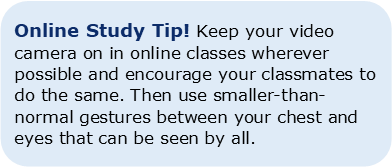
Challenge 2: Making Friends
In English, ‘small talk’ is a common expression that’s used to describe the friendly and light conversations that people have as they interact as colleagues or acquaintances. Small talk might happen when you sit down at the start of a seminar, when you’re waiting to enter the classroom or shortly after class finishes. Whenever it occurs, informal friendly chats can help to create familiarity and rapport among a group and even form the start of life-long friendships. Unfortunately however, small talk and the opportunity to make friends can be easily missed when studying online.
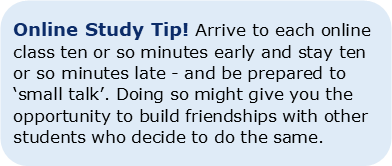
Challenge 3: Getting Help
Getting assistance from your tutor can also be harder to do when you’re studying online. While raising a hand or staying after class is an easy and effective way for students to gain the attention of their teacher, it may not be easy to have a ‘quiet word’ with that professor when classes are being conducted from various locations around the world in various time zones. This lack of quick, 1-2-1, student-tutor communication can, if left unchecked, limit rapport building and lead to a lack of confidence between both parties.

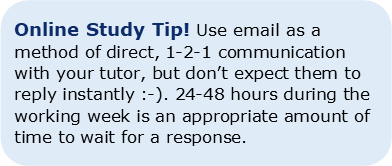
Challenge 4: Being Disciplined
Independent (autonomous) learning is a life-long skill that all university tutors wish to help their students effectively develop. However, without the more consistent face-to-face presence of a teacher, and potentially lots of tasks to complete outside of live interactions and at your own schedule, students have to be committed to their online studies if they intend to succeed. In online learning, for example, it may be easier to forget a reading, not complete an activity, or misread instructions to the point of not realising that there was a forum discussion you had to participate in or an online quiz you had to complete. Miss too many course components and at best your learning experience will be less enriched; at worst, you may fail entirely.
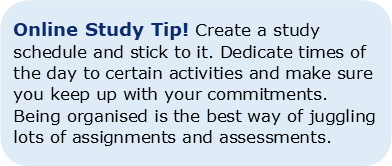
Challenge 5: Overcoming Tech Troubles
Finally… technology problems – we’ve all been there! No software is perfect, and almost all technology takes some practice to really learn its benefits and how to best use it. At first, students may feel that studying online is slower and more awkward and can be easily interrupted due to technical problems. There may be a delay in your video and audio, your microphone may suddenly not work, or you may be unable to download your necessary resources. Whatever you do, don’t panic. Your teacher will be understanding, and you should be understanding of their difficulties too. After all, it’s a wonder of technology that people on opposite sides of the planet are able to share a classroom at all :-).
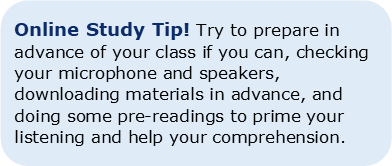
While we’ve learnt that online learning environments may present challenges, the good news is that most of these issues can be easily overcome. Review the challenges listed here in our Chapter 2 Worksheet and then continue reading with Chapter 3 to discover our top tips for online study success.
To reference this reader:
Academic Marker (2022) Studying Online. Available at: https://academicmarker.com/academic-guidance/teaching-and-learning/digital-learning/studying-online/ (Accessed: Date Month Year).
Downloadables
Once you’ve completed all three chapters in this short reader about Studying Online, you might then wish to download our Chapter Worksheets to check your progress or print for your students. These professional PDF worksheets can be easily accessed for only a few Academic Marks.
Chapter 1 explores the topic: What are the different types of online learning? Our Chapter 1 Worksheet (containing guidance, activities and answer keys) can be accessed here at the click of a button.
Chapter 2 explores the topic: Which 5 challenges arise from studying online? Our Chapter 2 Worksheet (containing guidance, activities and answer keys) can be accessed here at the click of a button.
Chapter 3 explores the topic: Which 8 tips guarantee success in online classes? Our Chapter 3 Worksheet (containing guidance, activities and answer keys) can be accessed here at the click of a button.
To save yourself Marks, click on the button below to gain unlimited access to all of our Studying Online Chapter Worksheets. This All-in-1 Pack includes every chapter, activity and answer key related to this topic in one handy and professional PDF.
Collect Academic Marks
-
100 Marks for joining
-
25 Marks for daily e-learning
-
100-200 for feedback/testimonials
-
100-500 for referring your colleages/friends